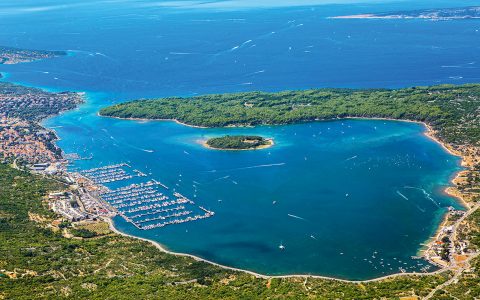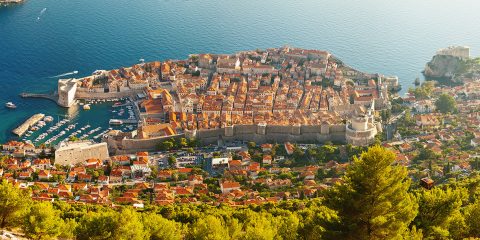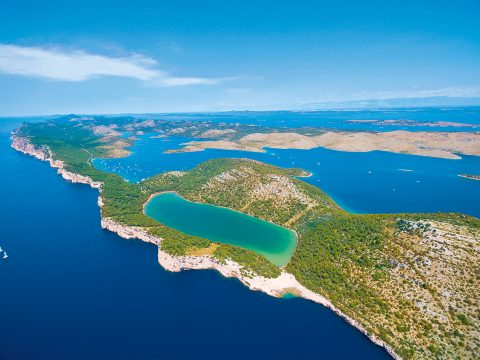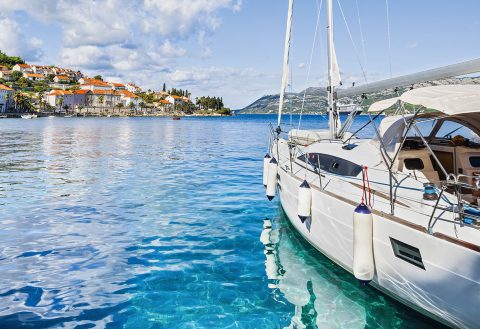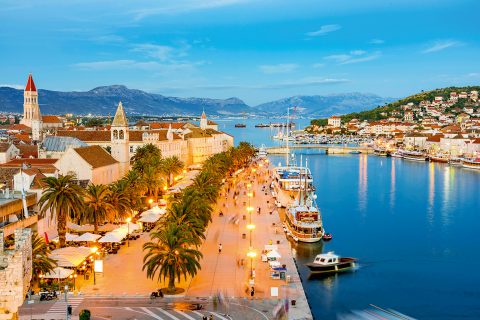Croatia
Cruising grounds
Winds
Various winds prevail in the Adriatic Sea. Bora is a dry, cold northerly and north-easterly wind which should not be underestimated, especially in Kvarner Bay and in the Velebit channel. The Sirocco, called Jugo in Croatia, brings warm and humid air, usually combined with rain, from southerly and south-easterly directions. The Maestral usually blows from north-westerly directions.
Noteworthy
The cost of living in Croatia may still be comparatively moderate, but berthing prices are not. Fees have notably increased over the past few years. Tourists have to pay a local sojourn tax in Croatia. The regulation requires boat owners to pay a one-off amount for themselves and for any persons staying overnight on the boat, such payment to be made directly when registering with the port authority. The amount of the tax depends on the length of the boat and the duration of the stay of persons onboard.
Regulations
Recreational boaters cruising Croatian coastal waters have to comply with, in some cases, quite strict regulations.
Necessary paperwork
We recommend that you carry the following documentation:
- skipper qualification for coastal waters or adequate proof of competence
- crew list (only relevant when entering Croatia by sea)
- valid international certificate for pleasure craft issued by ADAC or other proof of boat registration
- Proof of ownership or boat owner’s notarized authorisation
- EU VAT proof
- Evidence of boat liability insurance cover(mandatory for boats over 15kW)
- EU Declaration of Conformity for boats built 1998 or later
- proof of fees paid
- Nautical information chart (INFO 101)
Entry and exit by boat
If you borrow a vessel from a friend or relative, you must produce the owner’s written authorisation at the border. The document must be notarized by a domestic or foreign authority or certified by a notary public. Moreover, a copy of the valid boat registration from the country of origin is compulsory. Without these papers, you will usually not be allowed into Croatia with a pleasure vessel that you do not own. You can download a sample power of attorney here.
By sea
Entering Croatia by sea, you must approach the nearest port of entry without any delay or intermediate stop, on the shortest route, and promptly report to the port authority for inward clearance. You will have to present the crew list to the port authority.
Before leaving Croatia by sea, you must report to the port authority for outward clearance.
By land
If the boat is transported to Croatia by land before being launched into the water, it must be registered with the port authority. No crew list will be required in this case.
Customs
The EU Customs Code applies in Croatia. Therefore, boats from the EU need no longer be temporarily imported to Croatia. For free navigation around the waters of the EU a recreational craft (owned by a EU citizen) must have Union goods status. This is usually the case where the boat was bought in the EU or imported into the EU and released for free circulation. Proof of the Union Good status, e.g. in the form of theT2L document or the original invoice with VAT shown, should be taken along.
Moreover, you need proof that the boat was not berthed in Croatia at the time the country joined the EU; otherwise, a customs declaration will be required for the boat.
Customs declaration
For any boats or yachts which, at the time of Croatia’s accession to the EU on 1 July 2013, were located in Croatia, i.e. berthed in a marina or stored in a customs warehouse, their owners need to make a customs declaration in Croatia. The vessels are thus cleared for free navigation around the waters of the EU. This procedure is mandatory, regardless of the boat’s size and age and whether or not customs duties will be due. Outboard engines are listed under a separate customs tariff number because their VAT classification may vary.
EU VAT proof
You may need to produce proof of VAT payment upon request for any vessel within the EU (e.g. original invoice with VAT shown, confirmation by an authority or, if applicable, T2L document).
Boat registration and registration numbers
You need to carry the registration required in your home country. If no registration is needed in your country, we recommend nonetheless to register the craft. This will facilitate dealings with local harbour and other authorities.
Fees
Navigation fees
In Croatia, various fees are charged for vessels longer than 2.50m as well as for vessels less than 2.50m in length but having an engine power of 5kW (6.8hp) or more. You are required to carry proof of payment of the fees!
The fees payable per calendar year to port authorities are listed in the Table below.
| Boat length (in m) | ≤ 2,5 | 2,51 - 11,99 | 12,00 - 40,00 |
|---|---|---|---|
| Administration fee | 40 kn | 40 kn | 40 kn |
| Boat security fee | 20 x L + 2 x kW | 20 x L + 2 x kW | 20 x L + 2 x kW |
| Information card | 20 kn | 20 kn | 20 kn |
| Beacon fee | 10 kn x L | 10 kn x L | 25 kn x L |
Sojourn tax (tourist or visitor’s tax)
Tourists have to pay a sojourn tax in Croatia. The owners of boats which are over 5m in length and equipped with bunks have to pay a one-off amount for themselves and for all persons staying overnight on the vessel, such payment to be made when registering with the port authority. In future, the sojourn tax is to be payable also in marinas and ports. This should reduce waiting times considerably, especially during the peak season.
| Bootslänge | Length of stay | Amount in HRK 2019 | Amount in HRK 2018 |
|---|---|---|---|
| 5 – 9 metres | up to 3 days | 90,00 | - |
| up to 8 days | 210,00 | 130,00 | |
| up to 15 days | 360,00 | 240,00 | |
| up to 30 days | 600,00 | 400,00 | |
| up to 90 days | 1.410,00 | 950,00 | |
| up to 1 year | 1.800,00 | 2.000,00 | |
| 9 – 12 metres | up to 3 days | 150,00 | - |
| up to 8 days | 350,00 | 400,00 | |
| up to 15 days | 600,00 | 700,00 | |
| up to 30 days | 1.000,00 | 1.200,00 | |
| up to 90 days | 2.350,00 | 2.900,00 | |
| up to 1 year | 3.000,00 | 5.800,00 | |
| 12 - 15 metres | up to 3 days | 210,00 | - |
| up to 8 days | 490,00 | 500,00 | |
| up to 15 days | 840,00 | 950,00 | |
| up to 30 days | 1.400,00 | 1.600,00 | |
| up to 90 days | 3.290,00 | 3.850,00 | |
| up to 1 year | 4.200,00 | 7.700,00 | |
| 15 - 20 metres | up to 3 days | 240,00 | - |
| up to 8 days | 560,00 | 650,00 | |
| up to 15 days | 960,00 | 1.200,00 | |
| up to 30 days | 1.600,00 | 2000,00 | |
| up to 90 days | 3.760,00 | 4.800,00 | |
| up to 1 year | 4.800,00 | 9.600,00 | |
| über 20 metres | up to 3 days | 300,00 | - |
| up to 8 days | 700,00 | 950,00 | |
| up to 15 days | 1.200,00 | 1.800,00 | |
| up to 30 days | 2.000,00 | 3.000,00 | |
| up to 90 days | 4.700,00 | 7.200,00 | |
| up to 1 year | 6.000,00 | 14.500,00 |
Information on the sojourn tax and the new rates can be found in our posting Croatia – new sojourn tax rates from 2019 (German only).
Fees for Kornati National Park
The fees for Kornati National Park have been raised by about 25-35% for the 2018 season.
The administration of Kornati National Park has published the official 2019 price list. Die Preise entsprechen denen von 2018.
You can buy tickets at much lower prices via the webshop. Tickets are available for 1 day, 3 days or 7 days. Lower prices also apply to vessels no more than 6.99m long and off-season.
Skipper qualification
Certificate for operators of pleasure craft
The corresponding documentation from the skipper’s home country for the specific cruising ground is mandatory. Under Croatian law you need a certificate for operators of pleasure craft for coastal waters for engine-powered vessels, including boats with a power of less than 11.03kW (15hp).
- Boaters who do not have a certificate for operators of pleasure craft for coastal waters may acquire a Croatian coast boating licence from the port authorities. The boating licence is valid only in Croatia.
Radiocommunication licence
Onboard vessels with radio equipment, at least one crew member must hold a suitable radiocommunication licence. For the Croation coast, the SRC is usually sufficient.
- SRC (Short Range Certificate). “Restricted radio operator’s certificate”, valid for VHF and GMDSS.
- LRC (Long Range Certificate): “General radio operator’s certificate”, valid for GW, HF, VHF, Inmarsat and GMDSS.
Equipment
Under their duty of care, skippers are required to carry sufficient on board rescue equipment in relation to the vessel’s size. For valuable information on the adequate safety equipment, please refer to the recommended minimum equipment for pleasure boats and yachts (›Empfohlene Mindest- und Sicherheitsausrüstung für Boote und Yachten‹, in German only).
Recommended equipment
In order to avoid problems during potential inspections by Croatian authorities, we recommend to carry the following mandatory safety equipment onboard:
- Anchor (of suitable weight and type)
- Anchor line or chain with a length of 25-100m
- Cleats or other securing devices
- 3 suitable, long and break-proof mooring lines
- Bilge system
- Engine maintenance tools
- Suitable number of spare parts for secure engine operation
- Life jackets for everyone onboard
- First-aid kit
- Light, torch (International Regulations for Preventing Collisions at Sea)
- Signal horn
- Waterproof torch
- 2 matchboxes or cigarette lighters (waterproof)
Portable fire extinguisher:
- 2kg for outboard and inboard engines up to 20kW
- 6kg for outboard and inboard engines over 20kW
- an extra 4kg for watercraft with accommodation spaces and cooking equipment
Flare guns
To use a flare gun, you must hold the European Firearms Pass. You may import and use it as long as it is part of the vessel’s safety equipment.
Storage: During transport, the ammunition must be kept separate from the gun. Always keep it locked away onboard.
Declaration: There is no need for a written declaration of the flare gun when crossing the border by land or by sea. However, it would be prudent to inform the border officials personally about the gun before a potential control.
Marine radio equipment
Onboard marine radio equipment is recommended for safety reasons. To operate radio equipment for marine (or inland) waterways, you need to have the relevant licence.
Without such licence, you may not operate radio equipment.
The ATIS or MMSI number certificate, internationally recognised according to the Radio Regulations, is issued by the competent authority.
No restrictions apply to the importation, by sea or by land, of onboard nautical radio equipment used for navigation, safety and ship-to-shore as well as ship-to-ship communication, if the equipment is registered in the ship’s papers.
Environmental and ambient water protection
Nature reserves / national parks
Parts of the Croation coast are specially protected as national parks. These include the Brijuni islands, the Kornati islands, the Krka national park, as well as Mlet and the Limski canal.
Special regulations apply to cruising, anchoring and staying overnight in these areas.
Every vessel must carry a dedicated container for waste oil. Disposal tanks are set up in all marinas and major ports
Traffic regulations for pleasure craft
Pleasure craft may be used only for private purposes. Private pleasure craft must not be offered for rental. Any pleasure craft used for commercial purposes must be registered with the Croatian Ministry of Maritime Affairs.
No more than two persons shall be onboard of watercraft 2.5m or less in length at any time.
Anchoring
There are protected parts of the Croatian coastal waters where special rules apply to anchoring and staying overnight.
Navigation and collision prevention rules
Motor boats and sailing yachts must keep a minimum distance of 50m from the coast or from beach limits, 150m from natural beaches, 150m from yachts, and 300m from ships and hydroplanes.
Speed limits
Unless signposted otherwise, the following speed limits apply to all watercraft:
- 5 knots within 150m from the coast
- 8 knots between 150m and 300m from the coast
When entering or leaving a harbour, skippers must lower their travel speed to a level allowing easy and fast manoeuvring or stopping.
Straights and canals should be navigated at reduced speed so as not to pose a risk for shipping traffic.
A speed limit of 5 knots applies to navigation in the following bays along the western and southern coast of Istria/Croatia:
Croatian part of Piranski Zaljev, Lim canal, Luka Veruda, Luka Budava and the Bay of Medulin.
Speed limits also apply in the national parks.
Insurance for pleasure craft
Mandatory insurance
Boat liability insurance cover is mandatory for vessels with an engine performance in excess of 15kW (20.39hp). The minimum amount of cover is 3,500,000 kuna, i.e. approx. €460,000. You must keep evidence of cover onboard the vessel. Boat liability insurance cover is recommended for boats with lower engine power as well.
Further water sports activities
Water scooters
Water scooters etc. are required to keep a minimum distance of 300m from the coast and may only be operated in waters where they are not expressly prohibited.
(Wind) surfing
(Wind) surfers may keep a distance of less than 50m from the coast. The required minimum distance from natural beaches is 150m. (Wind) surfers must stay within 500m from the coast.
Diving
Underwater sports equipment must be registered with the port authority.
Miscellaneous
Car documents
Have your vehicle registration papers with you.
We recommend you also carry the international Green Card with you, since it serves as proof of insurance (very important for cars with trailers) and facilitates claims settlement after an accident.
Pets
EU pet passport documenting a valid rabies vaccination. Identification of the pet by a microchip. All dogs must be kept on a lead; attack dogs must additionally wear a muzzle. Bull terriers and their crossbreeds are not allowed.
Boat towing
Speed limits
For vehicle & trailer combinations: 50kph in built-up areas, 80kph outside built-up areas, and 90kph on motorways.
Vehicle-trailer combinations
In Croatia, the following maximum dimensions apply: 2.55m in width, and 18.75m in length. Drawbar trailers: 2.55x12m. Two warning triangles are mandatory for every vehicle-trailer combination.
Vehicle-trailer combinations and RVs whose dimensions exceed the allowed limits require special authorisation. Such special authorisation is available from:
HRVATSKE CESTE D.O.O.
Ispostava Zagreb
Vončinina 3
10000 Zagreb
Croatia
Phone: +385 1 472 25 55
info@hrvatske-ceste.hr
www..hrvatske-ceste.hr
Centre for Combined Transport/CKTZ
Trg senjskih uskoka 7-8
10020 Zagreb
Croatia
Phone: +385 1 652 40 70
Fax:+385 1652 40 19
zagreb@cktz.hr
www.cktz.hr
Promet Varjacic
Bregovita 13
49000 Krapina
Croatia
Phone: +385 1 37 19 00
Fax: +385 1 37 21 20
transport@krapina-sped.hr
www.krapina-sped.hr
Propellers
Make sure the propeller is properly protected before each trip. The unprotected propeller of a vessel carried on a trailer is a potential hazard. Therefore, the propeller needs to be covered so as to prevent the risk of cuts. Non-compliance with these provisions when towing a boat is subject to a fine.
Rules of the Road
Headlights must be on also during the day (from the end of October until the end of March). We recommend you take a spare set of light bulbs/lamps with you. Do not pass stopped school buses or buses transporting children.
All car drivers must carry high-visibility vests onboard and wear them on the road at the site of an accident. This provision applies both within and outside built-up areas.
Motorcyclists are also required to wear such vests. In low visibility and in darkness, cyclists must also wear a high-visibility vest.
All accidents must be reported to the police. German vehicles having their bodywork damaged in an accident may leave Croatia only with a police report confirming the damage.
Helpful information
Roadside assistance
Hrvatski Autoklub (HAK)
Avenija Dubrovnik 44
10010 Zagreb
Croatia
Phone: +385 1 661 19 99
Fax: +385 1 662 31 11
hak@hak.hr
www.hak.hr
Emergency phone numbers
112 police and rescue services
Distress calls
Coastal waterways
The national Marine Rescue Coordination Centre (MRCC) in Rijeka is available around the clock and coordinates all search and rescue missions. The MRCC can be contacted by radio (VHF channel 16) and GMDSS (DSC, VHF channel 70 or DSC frequency 2,187.5kHz).
Phone numbers of the MRCC are 195 within Croatia and +385 51 195 if you are calling from outside Croatia.
The eight port authorities in Pula, Rijeka, Senj, Zadar, Šibenik, Split, Ploce and Dubrovnik, as well as their branch offices can be reached around the clock in emergencies.
Sea rescue
Slovenia: SAR, phone: +386 56 63 21 08, VHF channel 16
Croatia: SAR, phone: +385 51 195, VHF channel 16
Maritime breakdown assistance
EmergenSea, phone: +385 996 112 112
SeaHelp, phone: +385 919 112 112
SeaTow, phone: +385 99 222 80 00
Country code
+385
VAT
VAT is 25%.
Currency
Kuna (1 euro = HRK 7.43 (April 2019)
Yacht charter
The Eastern Adriatic as a yacht charterer’s Eldorado. The rugged Adriatic coast from Istria to Southern Dalmatia and its off-lying islands provides a fantastic scenery for cruising against the backdrop of a dream landscape.
On-board library
Service app nIS
The free service app Nautical Information Service (nIS) for Android and iOs includes important provisions and safety-relevant instructions.

